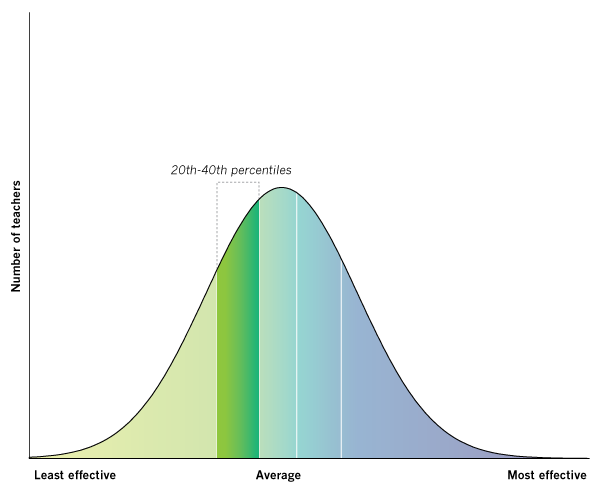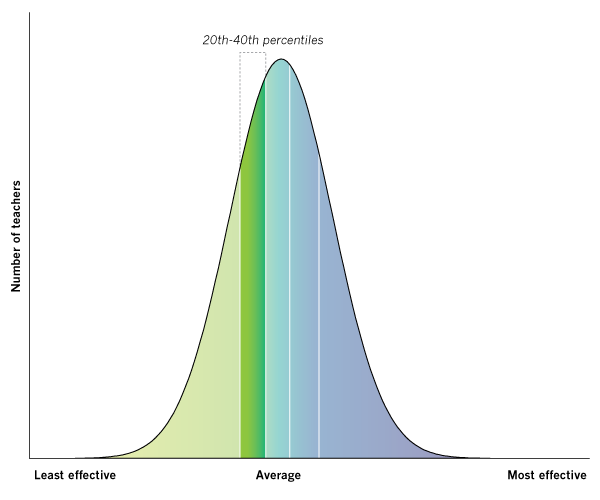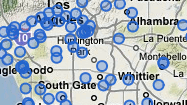Maria Laura Perez
A 3rd grade teacher at Second Street Elementary in 2009
These graphs show a teacher's "value-added" rating based on his or her students' progress on the California Standards Tests in math and English. The Times’ analysis used all valid student scores available for this teacher from the 2002-03 through 2008-09 academic years. The value-added scores reflect a teacher's effectiveness at raising standardized test scores and, as such, capture only one aspect of a teacher's work.
Compared with other Los Angeles Unified teachers on the value-added measure of test score improvement, Perez ranked:
- Least effective overall.
- Less effective than average in math. Students of teachers in this category, on average, lost about 4 percentile points on the California Standards Test compared with other students at their grade level.
- Less effective than average in English. Students of teachers in this category, on average, lost about 3 percentile points on the California Standards Test compared with other students at their grade level.
Perez's LAUSD teaching history
2002-03 through 2008-09 academic years
- Second Street Elementary, 2009 - 2003
Maria Perez's Response:

It is unfair for teachers to be judged based on student test scores. First of all, students are not put in classes randomly. There are certain requirements that need to be met. Students are placed in classes according to English proficiency levels. Teachers are not allowed to select a particular class, only a particular grade. I happen to work with the lower ELD levels. I usually work with students who have not progressed in English proficiency despite the fact that many have been here in the country since kindergarten. There are reasons for this. Some of these students have learning disabilities that have not been identified, others need glasses or hearing aids, a few exhibit challenging behaviors that affect not only their own learning, but the learning of other students in the classroom, and some may simply be slow learners. Many of my students have gaps in their learning, and do not have the academic vocabulary needed to perform well on these tests. However, the district expects us to follow the same pacing plans despite the fact that many of my students learn differently. Additionally, since students also learn from one another, they need peers who can be role models. When students are grouped based on their English proficiency level, the lower ELD level students tend to lack good role models. Another reason why it is unfair to judge teachers this way is because test scores do not tell you if a student left the country and returned, only to be present in one's classroom for 1 or 2 months. In cases such as these, of course their scores are going to go down, they missed most of the instruction. Test scores do not tell you about special circumstances a child is undergoing such as a death in the family, moving to a new place, divorce, or illness, just to name a few. All these factors can affect how well a student learns and performs. Yet another factor that affects student test scores includes directives a teacher or teachers receive from administrators. Administrators don't just evaluate us, they also give us directives which we must follow. One final note I'd like to add is that test scores are not segregated by English Language Development levels. Two teachers working with English Language Learners might have extremely different results if one of those teachers works with ELD levels 1 and 2, while the other works with ELD 3-5. If students were placed randomly in classes, and all teachers were given the same directives, then I could see how your way of measuring teacher effectiveness would be valid. Since this is not the case, you are unfairly judging a teacher's competence.
![]() The Times gave LAUSD elementary school teachers rated in this database the opportunity to preview their value-added evaluations and publicly respond. Some issues raised by teachers may be addressed in the FAQ. Teachers who have not commented may do so by contacting The Times.
The Times gave LAUSD elementary school teachers rated in this database the opportunity to preview their value-added evaluations and publicly respond. Some issues raised by teachers may be addressed in the FAQ. Teachers who have not commented may do so by contacting The Times.
|
|
 Delicious
Delicious
|
 Digg
Digg
|
 Facebook
Facebook
|
 Twitter
Twitter
|









